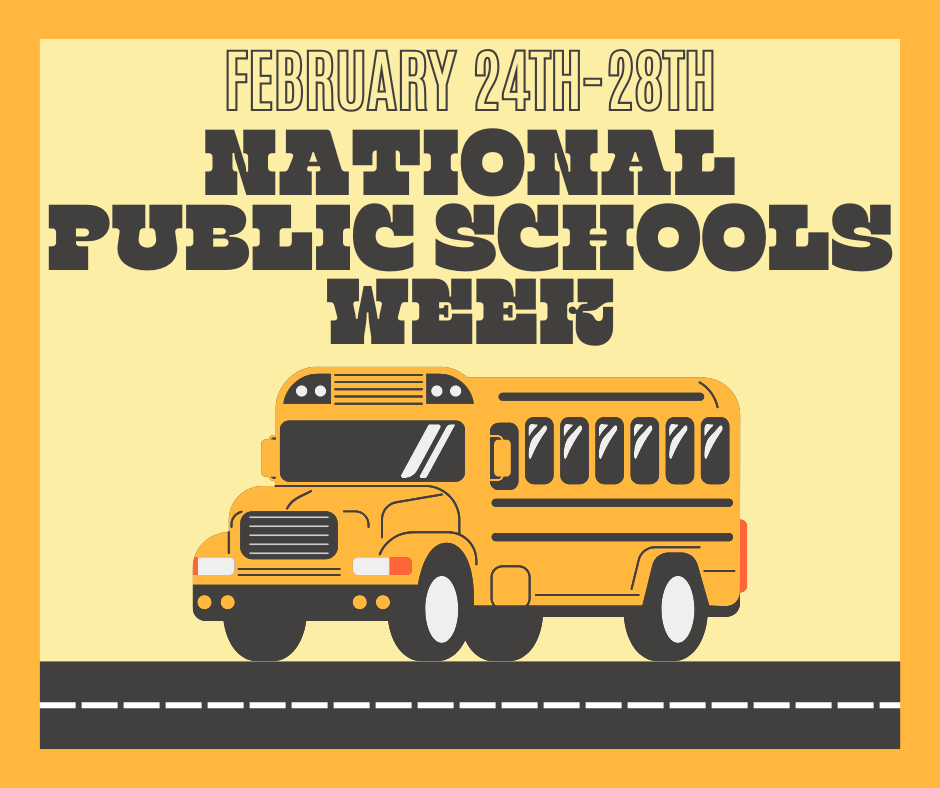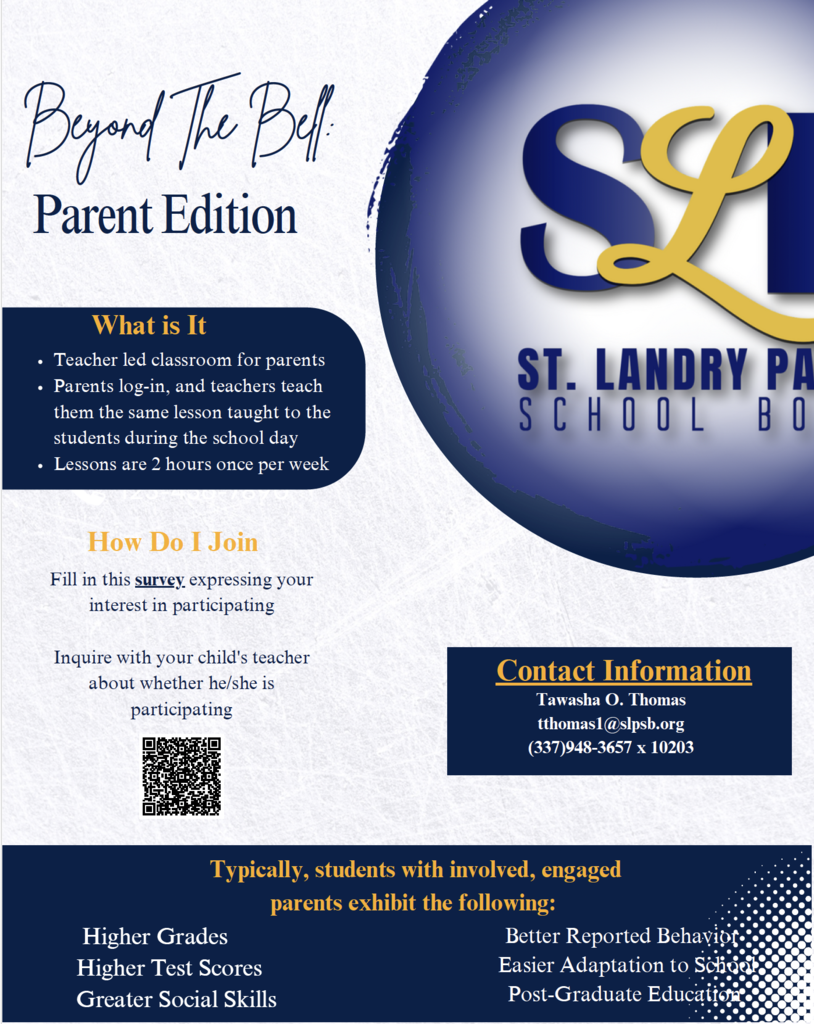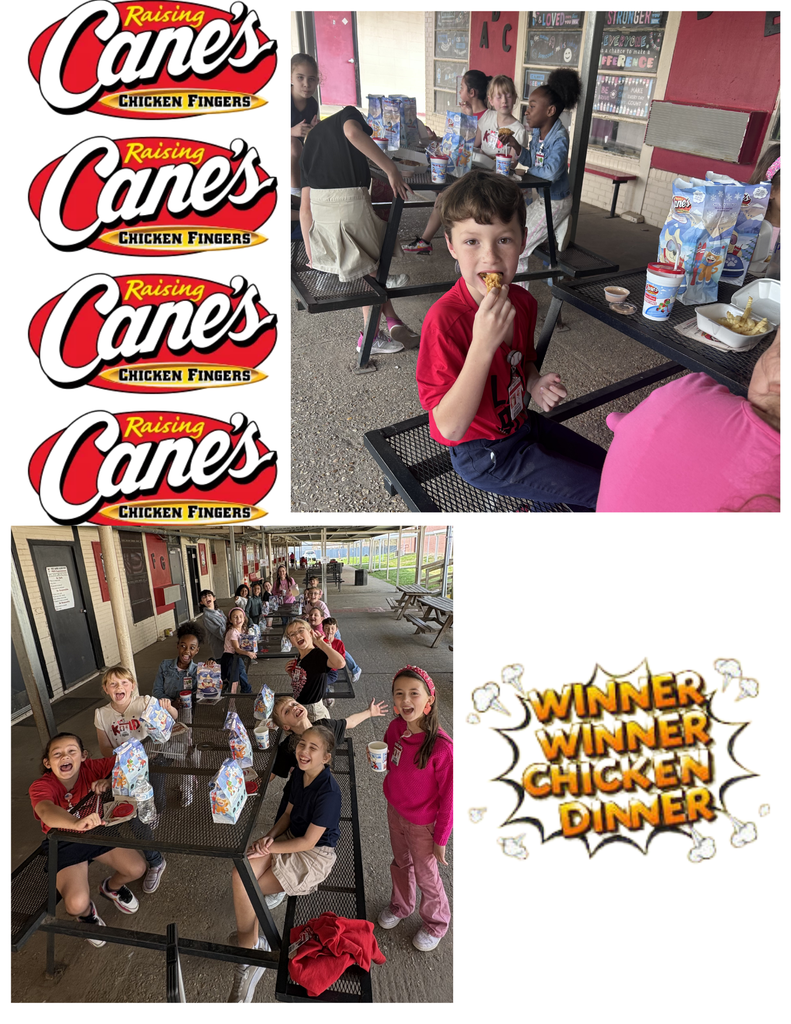Promote the savings habit by having your elementary schooler divide pocket money into three jars. The first jar is for change your child is free to spend as desired. The second jar is for saving for more expensive items that may take a few weeks or months to afford. The last jar is for long-term savings for big ticket items like college, for example.
https://tpitip.com/?16bX17376
This week, we join districts across the country in celebrating the incredible students, dedicated teachers, and hardworking staff who make our schools the heart of our community. Thank you for choosing St. Landry Parish!

In order to think analytically about reading material, your child must learn to separate fact from opinion. For practice, give your child a news article on a subject of interest. Cut off the headline. Ask your child to read the article and underline the facts in red and the opinions in blue. Then, have your child write a new headline. How does it compare to the original?
https://tpitip.com/?16bW17376
👉https://app.smore.com/n/etapw
Here’s what’s inside ⬇️
- Tutoring resumes this Monday, February 23.
- Friday, February 27 - Popcorn sale for $1.00
- February box Top challenge - Did you download the box top app and start scanning your receipts? PreK is currently in the lead.
- PreK enrollment for the 2026-2027 school year is now open.
- We did not meet our attendance goal the week of February 19-20, 2026! Please help us to make sure students arrive on time and stay for the entire school day — every minute counts! 🙌
Who? What? When? Where? Why? Teach your elementary schooler to keep these questions in mind while reading, and your child will begin to read more carefully and understand the material better. What happened in the story? Where did it happen? Who was involved? When did it happen? Why was it written? Talk with your child about the answers. If your student can't answer the questions, suggest reading the passage again.
https://tpitip.com/?16bV17376
To be responsible students, children must take the job seriously. For that, they need their families' support. Make learning a priority in your family's life. Visit the library, explore new places, take nature walks. Establish routines that make reading and studying an expected part of each day. Encourage your child to keep trying when schoolwork is tough. And when your student has questions, demonstrate how to find the answers.
https://tpitip.com/?16bU17376
When kids have time to think about what they want to say, they sometimes share their deepest thoughts. Try sharing a journal with your child. Glue a picture of the two of you onto a notebook, then write something positive about your child. It might be about how hard your student is trying in school or how your child makes you laugh. Leave it for your elementary schooler to read. The next day, it is your child's turn to write to you. Keep it up all year!
https://tpitip.com/?16bT17376

📢 Beyond The Bell: Parent Edition - St. Landry Parish parents, would you be interested in attending our teacher-led virtual lessons to get a glimpse into your child's classroom learning experience?
Complete the interest survey here, https://tinyurl.com/SLPLBBPE.
For additional information, visit https://aptg.co/ZntH5G.
Contact Tawasha Thomas at (337)948-3657 x10203 with any questions.

A huge shoutout to our top-performing homerooms:
🌟 And the winners are... 🌟
Mrs. Emily--Pre-K
Mrs. Krystle--1st Grade
Mrs. Rideaux-- 2nd Grade
Mrs. Miller--2nd Grade
Mrs. Stelly--2nd Grade
Attendance is such a vital part of student success. When students are here, they are growing, socializing, and building the foundation for their futures.
#PBEPride #AttendanceMatters #ShowUpToGlowUp #StudentSuccess #PBEFamily

A huge congratulations to Mrs. H. Fontenot’s 3rd Grade Homeroom for being our big Raising Cane’s Fundraiser Winners! 🏆
To celebrate their hard work and school spirit, the class enjoyed a delicious Cane’s party under the breezeway. There’s nothing like some chicken fingers and Texas toast to make a school day extra special!
Thank you to all our PBE families who participated in the fundraiser—your support makes events like this possible.
Way to go, 3rd Grade! ❤️💛
#PBEPride #RaisingCanes #FundraiserWinners #ThirdGradeRockstars #CommunitySupport


When it’s time to teach limits, play the Too Much Game. To start, tell your child the rule: "When I say 'too much,' you name something that is good normally, but bad when overdone. Then, say the negative consequence of having too much." Your child might say, "Food is good, but eating too much is unhealthy." Take turns and have some fun: Too much bathing might wash your skin off!
https://tpitip.com/?16bS17376
👉https://app.smore.com/n/hz2c9
Here’s what’s inside ⬇️
- Thursday, February 19 - Students return to school.
- No after school tutoring this week . Tutoring resumes on Monday, February 23.
- Friday, February 20 - Students may wear a black history-themed shirt or a red or black shirt for free. 👕 Shirts may be worn for FREE with regular school uniform bottoms.👖 Jeans may be worn for $1.00, unless you have already paid for the year.
- Friday, February 20 - Black history program starting at 1:00 pm and 2:00 pm (see details in newsletter).
- Friday, February 20 - Kona Ice will be on campus.
- February box Top challenge - Which grade level can scan the most box tops? PreK is currently in the lead.
- PreK enrollment for the 2026-2027 school year is now open.
- We did not meet out attendance goal the week of February 9 - 13, 2026! Please help us to make sure students arrive on time and stay for the entire school day — every minute counts! 🙌
Studies show that American students tend to do poorly in geography. Here's a game to help your child learn where places are. When you are on the road together, make your child the "license-plate lookout." Your child should write down the out-of-state license plates. When you get home, help your student locate the states on a map or globe and mark each one with a sticker. Can your child collect all the states?
https://tpitip.com/?16bR17376

Happy Valentine’s Day to all! ❤️🔥
#LilRedHots #VDay #PBEPride




